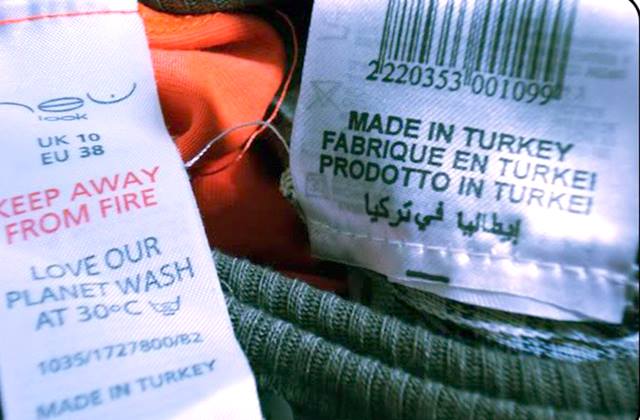
Turkish Déjà vu

Just 10 years ago—25 April, 2006, I was elucidating a press conference, which (upon initially issued report) was to cover food safety.
Speakers were heads of consumers’ interests protecting two NGOs, who fluently passed from the topic of food safety to Armenia-Turkey relations and patriotism. “The Armenians shouldn’t buy Turkish products. Not for the fact, that they are low-quality or dangerous, simply for the reason that they are Turkish,” one of the speakers said.
What happened next? Armenia-Turkey trade turnover in the following two years was tripled reaching from USD 97 million to USD 270 million (2008). 10 years later the same offer is heard. However, not in form of a boycott, but that of passing a law. And not during the press conference, but at NA session. “Prohibit import of goods from Turkey to Armenia, remove Yerevan-Istanbul-Yerevan flight, ban entrance of Armenian tourists to Turkey…” Author of the proposal, made a few days ago, was Levon Dokholyan, member of “Rule of Law” party. He grounded his call by Turkey’s tactics of instigating Azerbaijan for war, as well as the threat to the Armenian society through food and other means.
Artsvik Minsayan, RA Minister of Economy, replied, that the issue has become contemporary among the public, there is an assignment by the PM, and the Ministry of Economy is implementing a survey. However, he stressed—particularly regarding the goods, which threaten Armenia’s economy from the viewpoint either of quality or competition. Accordingly, Minasyan attempted to introduce that proposal under more acceptable and grounded light, adding, that clear action plan will be introduced in near future.
Of course, the idea of prohibition or restriction of import of Turkish goods may be approved by the many, particularly these days. However, it’s worth analyzing what we currently have and what will it give.
Benefits of banning the import of Turkish goods
Economically there is no benefit as it is. In this case, our benefit is Turkey’s financial loss, i.e. depriving the latter of money, which it obtains for goods consumed in Armenia. What implication will this have for Turkey? To make the picture clear, it’s worth mentioning 2 figures.
In 2015 Turkey’s total export volume comprised about USD 144 billion. Turkish goods have been imported to Armenia by the volume of USD 137 million in 2015 (according to the country of origin). This means, that Armenia’s specific gravity in Turkey’s export comprises just 0.09%, this means, Turkey won’t even feel that blow.

Another potential benefit, which is sometimes touched upon, is that Turkish goods may be substituted by Armenian ones. Accordingly, it will boost local production.
How realistic is that? Again a few numbers are worth introducing. More than 570 goods have been timported in 2015. Moreover, there is not a single product, specific gravity of which is more than 5%, i.e. import from Turkey to Armenia (and not only to Armenia) is rather diversified and we’ll hardly substitute all of them. Unfortunately, they’ll be substituted not by Armenian, but with Russian or other production. Linked to quality, Turkish goods by price/quality ratio mainly fit in average category.
As to the allegation, that Turkey intoxicates us through food, it belongs to the theory of conspiracies. How will the Turkish producer know, which part of his produced batch will go to Armenian market? Trade of the greater part of goods is mediated: we buy most part of Turkish production not directly from Turkey, but from the neighboring countries.
According to official statistical data, products of Turkish origin with the total cost of USD 137 million have been imported to Armenia, however, from the standpoint of the purchaser, products costing USD 91.1 million have been purchased directly from Turkey. This means, Turkish goods by about USD 46 million (from which food as well), have been resold by other countries. In short, you may judge for yourself, what we may economically gain. To our mind—nothing.
Damages
What do we lose? Naturally, in case of restricting Turkish production, likewise answer may be anticipated: Turks will also ban import of Armenian goods. However, in this regard, our losses won’t be more, as our export comprises not a considerable volume (USD 1.5 million). This may be sacrificed.
However, losses aren’t restricted only in this. Firstly, a few thousand Armenian families earn their living by trade with Turkey. It’s another point, why it’s so. It’s a fact, that banning of Turkish goods deprives these people’s living means.
Besides, there are products, which are mainly imported from Turkey (from toilet paper to citrus fruits). If banned, deficit will be observed, which will be followed by sharp price rise. Construction materials and Turkish raw materials, used in Armenian industry, should also be added to this.

The argument, that Turkish goods will be quickly replaced by Armenian ones, is rather weak. As the market dictates its rules, and if, for instance, it was possible to produce cotton yarn or knitted poster with the same price and quality in Armenia (or import from other countries), presently, 80% of those goods wouldn’t be imported from Turkey. This means only one thing—place for Turkish goods won’t be empty, but the price will be higher.
RA Government also realizes all this. That’s why Artsvik Minasyan replied, that actions should be accurately calculated, not to create a social explosive situation.
Market logic
Generally, boycott out of political reasons isn’t a good thing. And tough banning is not correct. One shouldn’t be banned to buy a product of any country or having a vacation by law. Or even if it’s done, the citizen should be somehow compensated for that.
If going to Antalya is banned, and instead it’s offered a vacation in Tsaghkadzor for rather expensive prices, slightly said, it’s incomprehensible.
Every person should weigh patriotism and financial appropriateness. Only one data should be mentioned here: trade turnover with Turkey in 2015 was triple times more, than that of Belarus and Kazakhstan brought together. And this under the closed border with Turkey, and with those two countries we are a member to the same economic union.
The reason is, the market dictates its rules. Our main issue is not that fact, that we import goods from Turkey, but the fact, that we were unable to develop sound industry targeted at export, relying only on mining and brandy.
By Babken Tunyan























